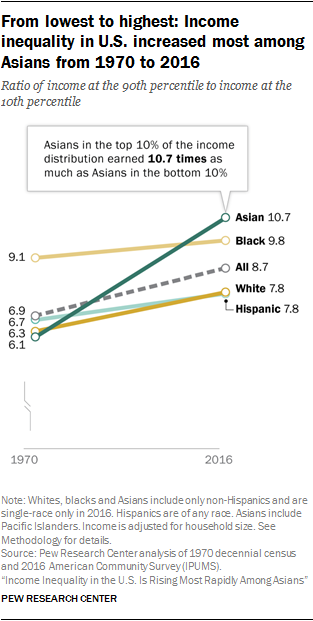-
What is the Problem with Individualism?That's a lie, I never claimed that individualism seeks to secure power over others. I said there may be the implication that an individualist wants to secure their power by eliminating the competition, ...
— praxis
That would make them a non-individualist, then. — Tzeentch
So individualist are in favor of antitrust laws? I thought y’all was all about FREEDOM!! -
What is the Problem with Individualism?You claimed that individualism seeks to secure power over others. This is not the case, as individualism recognizes such things as every individual's right to self-determination.
What you're doing is trying to blame individualism for negative human traits like greed and will to power, which is exactly the type of mischaracterization that Harry Hindu pointed out earlier. You're framing individualism as a form of egotism, which it is not. — Tzeentch
That's a lie, I never claimed that individualism seeks to secure power over others. I said there may be the implication that an individualist wants to secure their power by eliminating the competition, in response to Harry's silly strawman about collectivists wanting no dissonance in society.
I hope you two kids are having fun playing with your little strawmen. :roll:
Harry wrote: "Nothing [wrong with individualism], as long your individualism doesn't trample on another's right to be an individual."
How is beating another individual in a competition trampling on their right to be an individual? -
What is the Problem with Individualism?As ↪Harry Hindu pointed out, individualism includes recognizing the rights of other individuals and not just one's own. If one is consistent in their beliefs, an individualist actually would shy away from positions of power over others. — Tzeentch
I don't see how that follows. On an equal playing field (equal rights and opportunity) one individual can compete better, or just be luckier, than others and 'win'. Having won, the playing field would be less equal and the winner would enjoy an advantage. The rules would be the same but the winning individual would have superior resources at their disposal. They would have more power. -
Sacrifice. (bring your own dagger)do you not have a rational basis (as opposed to an empirical one) for believing in the existence of justice or must faith also play a role? — Hanover
We can be faithful or unfaithful to justice.
If I grasp the story right, the ultimate destination of highway 61 transcends any notion or feeling of sacrifice and faith is realized. More realistically on highway 61, some comfort is better than none, and we can soldier-on without being undone. -
What is the Problem with Individualism?It seems to me that you are implying that there should be only one group and no competition — Harry Hindu
Actually if there's any implication along this line it's that the Individualist wants to desimate the competition in order to secure their position of power. -
Rights Without ResponsibilitiesDo you want to go to a cardiac surgeon that is just trying a new procedure for the first time or would you rather that s/he had performed the procedure many, many times? — synthesis
Surgery is a special case because in addition to requiring medical knowledge, skill, and training, it requires opportunity to practice. For medicine in general an inexperienced graduate may be the better choice because they may be more likely to be up to date on the latest research, procedures, etc., whereas the experience old-timer might be more set in their ways. -
Has this site gotten worse? (Poll)I think a lot of the moderators have stopped commenting as much. Comments about moderation have dropped off. — T Clark
Where some see coincidence others see consequence. Seriously though, they probably helped to simulate interesting and good quality topics. -
What is the Problem with Individualism?Why by lottery and not by free elections? — Harry Hindu
They are free, and in fact every eligible citizen receives a free sticker just for participating. Why lottery? In attempt to remove the incentive for power seeking. There’s no point of investing in power seeking if power is randomly given.
You're the one that used a single word to describe individualists, as if the two terms were essentially conflated, when you only need to take a second to see how that is just as much a property of collectives as it is individuals. — Harry Hindu
I tried to describe the difference as succinctly as possible. You apparently disagree, offering the rationale that everyone both competes and cooperates.
Maybe it has to do with competition vs cooperation as it relates specifically to power distribution in society. The individualist wants to win the game and the collectivist wants to play the game indefinitely and where ‘everyone’s a winner!’, essentially. In real life this plays out as collectivists supporting collective power, such as workers unions, and individualists supporting capital free enterprise and its concentrations of power. -
What is the Problem with Individualism?That's strange that you don't see the autocrat as someone that competed to get to the top of society. — Harry Hindu
In my hypothetical society autocrats are appointed by lottery. Kinda rando but eminently egalitarian.
Individuals are free to work with others if they so choose — Harry Hindu
If they live in society they really have no choice but to be mostly cooperative.
I don't why you would think that competition is soley the characteristic of individualists. — Harry Hindu
Not sure how saying that someone may want to behave in a particular way means that they can only behave in that way.
Collectivists seem intent on limiting individual thought and imposing the thought of one individual on the rest. — Harry Hindu
Cooperation does require compatible values and goals, no getting around that. I imagine the same holds true for individualists who cooperate with each other. -
What is the Problem with Individualism?
Rather than try to explain why don't you simply say how the quote doesn't stand alone or how its meaning is distorted in isolation. -
What is the Problem with Individualism?it is fallacious of me to dismiss the anti-individualist argument because of the company they keep — NOS4A2
One of the very very few times that we agree. :love: -
What is the Problem with Individualism?One cannot force these conditions on an individual and then claim one is entitled to their coorperation. — Tzeentch
You can’t say that these conditions are forced on an individual that is at first completely unaware of them and then later at some point may realize they are dependent on them. If independence is ever reached then an individual may opt-out. -
Do Atheists hope there is no God?Do atheists actively not want God to exist? — Georgios Bakalis
I definitely would not want any God dreamt up by men/women to exist. That could only be a horror show. -
What is the Problem with Individualism?So your complaints are never about a fault in the idea of individualism, rather about the faults of the idea of authoritarianism. — Harry Hindu
That doesn’t make sense because an autocrat can be a responsible autocrat that acts cooperatively with society for the benefit of all, or more likely act irresponsibly and take advantage of their position for personal gain, perhaps even going so far as to deliberately impoverish the citizenry to better secure their autocracy.
To me it seems that the basic whole point, as you say, is that the individualist wants to compete and the collectivist wants to cooperate. Some think that competition is the natural way and others think that, because we have the capacity of reason, there may be a better way. -
What is the Problem with Individualism?
Sure, an individual in a weak socioeconomic position is entirely free to fuck-off and die, for instance. The problem, as stated from the beginning, is responsibility. Generally speaking, being responsible can result in increased stability and sustainability. Not exciting goals, and being responsible is a big bummer, but cooperation for mutual benefit has its benefits. It can be a more meaningful way of life. A rat race is for rats. -
The “loony Left” and the psychology of Socialism/LeftismIn general, 'let's redistribute wealth and empower oligarchs' is what rightism boils down to. It is an emotion-based knee-jerk reaction just as in the case of race, gender or environmental issues and that's where psychological manipulation by various self-interested individuals and groups tends to come into it. And it has also become a profitable business as the more vocal and persistent you are in such causes the more you get the attention of consumers and corporate donors keen on politicizing these issues.
-
What is the Problem with Individualism?The whole point of individualism is realizing that you are not the only individual, else you cease being pro-individual and begin being authoritarian. — Harry Hindu
Ohhhhh, I thought the whole point was freedom or personal liberty. Boy did I have it all wrong. :yikes: -
What is the Problem with Individualism?using government as a tool to contiunously attempt to expand individual rights is a self-defeating ideal. — Tzeentch
I'm not sure what you mean or if anyone has claimed otherwise. -
The Psychological Function of Talking About Philosophy (And Other Things In The Same Way)I don't think the impersonality needs to be justified because there's no negative consequence to it in philosophy as there is in other context, such as bureaucracies.
-
Solutions For A Woke DystopiaYou need to move beyond putting other people down. — synthesis
You’re choosing to play the fool, synth, I’m merely indulging you. -
Solutions For A Woke DystopiaLike him or not, the guy defied all odds and went from being a game show host to POTUS. If you don't understand what an incredible accomplishment that is (regardless of your opinion of him), then you need to re-evaluate some things. — synthesis
He was in a reality TV show, and arguably never ceased that occupation. James strikes me as someone having too much integrity to become POTUS in the same manner as Trump. I think most people do, actually. Aside from that, I imagine it's not too much trouble to buy and bankrupt a casino or two, if you've got enough of daddy's money to burn. -
Solutions For A Woke DystopiaAs I have told you before, Trump is who he is, but you think he is a loser? Well, let's compare your resume to his. What have you accomplished in this life? — synthesis
Who knows what James could have accomplished if he inherited nearly half a billion dollars. -
What is the Problem with Individualism?Power hungry individuals are, sadly, everywhere. And by not giving them strong states to hold power over... — Tzeentch
I think it was Benkei who pointed out that individual rights tend to diminish with government reduction. Dictatorships, for instance, are most secure with small coalitions of power and weak individual rights. -
Solutions For A Woke DystopiaDo you have statistics that suggest otherwise? — synthesis
Having trouble reading the graph I posted?
Here’s a tutorial that might be useful to you.
-
Solutions For A Woke DystopiaWhy do you think these people are so successful? Luck? — synthesis
Asian income inequality in the US has many factors. The bottom line is that the average Asian American is behind the average non-Asian American. If your racial stereotype were accurate they'd be above the average. -
Solutions For A Woke DystopiaIs that why the most successful groups in the U.S. are people of color...Asians. They are successful because they work their asses off. — synthesis
Probably shouldn't rely on racial stereotypes.

-
What is the Problem with Individualism?You mean like Somalia? — James Riley
Or just grown-ups.

Not the best example but was too adorable to resist. -
What is the Problem with Individualism?The principle at play here, is that the moral and physical impositions of the collective undermine the interests of the individual. — Tzeentch
What if a collective has little power and an individual has a lot of power, might not that individual undermine the interests of the collective? If the individual liked the power and wanted to stay in power they might intentionally take actions that weaken a collective in order to keep that power. The individual might try to make it difficult for the collective to organize, for instance, or promote the virtue of Individualism, and undermine their collective power. And of course divide and conquer has always been a crowd pleasing strategy.
We recognize that as injustice, especially when the injustice is magnified by one's own moral framework. Can you recognize it too when one's own moral framework is what hides it? — Tzeentch
I think moral frameworks rationalize behavior and not necessarily magnify or hide it. -
What is the Problem with Individualism?That essence, in India, has been called atma, the soul.
...
... the whole society depends on personality, the state, the church, organizations, the establishment are all lies. — Anand-Haqq -
What is the Problem with Individualism?In your scenario the culprit is Islamic fundamentalism.
— praxis
I don't think so. Islamic fundamentalism is an idea. — Tzeentch
Best I can make out you seem to be saying that Islamic fundamentalism considers itself invalid because it's an idea. I don't think that's what you're trying to say. -
What is the Problem with Individualism?Well I can only hope your love for family trumps your love for Trump and laissez-faire (fuck the working class) capitalism. Other than that, if I recall correctly, you claim to be a godless expatriate so no loyalties there.
I don't mind the concept of laissez-faire because it implies the state keeping their hands off of private affairs. But when corporations seek favor from state power my defense ends. — NOS4A2
Your defense of Trump has been nothing short of heroic. You've demonstrated such devotion that someone accused you of insanity the other day. I'd think that a virtue of individualism is in how individuals can abandon loyalties when what they've been loyal to becomes self-defeating. -
Solutions For A Woke DystopiaWould you like a mathematical proof? — synthesis
Sure, couldn’t be any worse than the Marx quote. -
Solutions For A Woke Dystopia
I'll take that as a no, you can't support the claim that the left wants equality of outcome. -
Solutions For A Woke DystopiaFrom each according to his ability, to each according to his needs — synthesis
In reality both Marx and Engels eschewed the entire concept of equality as an abstract and idealistic bourgeois aspiration, focusing their analysis on more concrete issues such as the laws of motion of capitalism and exploitation based on economic and materialist logic. Marx renounced theorizing on moral concepts and refrained from advocating principles of justice. Marx's views on equality were informed by his analysis of the development of the productive forces in society. — Wiki
I guess Marx wasn’t woke. :sad:
praxis

Start FollowingSend a Message
- Other sites we like
- Social media
- Terms of Service
- Sign In
- Created with PlushForums
- © 2026 The Philosophy Forum
